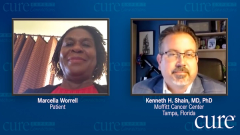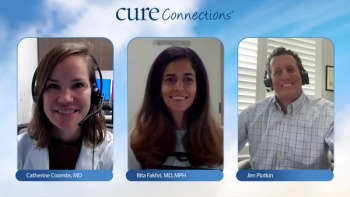
Reacting to a Diagnosis of Multiple Myeloma
A brief discussion of how Marcella reacted to her diagnosis of multiple myeloma and the importance of support networks for patients.
Episodes in this series

Kenneth H. Shain, M.D., Ph.D.: When you heard [that you had] multiple myeloma, is that something you had ever heard of before? How did you go through that process with Dr. [Daniel] Spitz?
Marcella Worrell: No, I’d never heard of it before. But after I was admitted into the hospital, Dr. Spitz came to me in the hospital and explained to me exactly what it was and what I was going through. It wasn’t an easy time. My son was young. I had all kinds of issues. I wasn’t sure how [long] I would be in the hospital, who would take care of my son, or what I would be going through. I was worrying myself worse than the myeloma. But he explained it all to me and told me, “You’ll get through this. You’re young enough.” I said, “Thank you. I’ll try.” After being my own advocate in the beginning and not just going on dialysis, I figured, “I can handle this. I’ll make it through.” My sister came through and helped me with my son, and then my head was in a more positive place. That’s how I knew what myeloma was, from Dr. Spitz explaining it and from going through it.
Kenneth H. Shain, M.D., Ph.D.: This may be tough to remember. When you were first told about this, how was it explained to you? If you remember, was it something like, “You have it. We’re going to take care of it”? How did that happen? If you can, think about the feelings you had and the ups and downs of it rather than the details.
Marcella Worrell: After Dr. Spitz told me I have multiple myeloma and that it’s a type of cancer, I was like, “My goodness, what is it?” He told me it’s something that affects your bone marrow. He spoke extensively about that, but I felt, “Why, Lord?” That was my first response. “What is it? Am I going to be here for my son?” It was very emotional. I cried the whole time. But after I got in the hospital and he explained it some more, I got a little better. I felt a little better, but only after I knew there was someone taking care of my son for me. That was my big thing. But besides that, it was very emotional.
Transcript edited for clarity.

